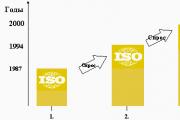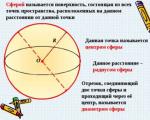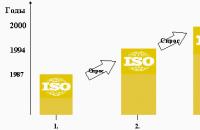11.01.2023
Award for conscientious performance of duties. IV
GOVERNMENT OF THE RUSSIAN FEDERATION
RESOLUTION
On the payment of bonuses to military personnel for conscientious and effective performance job responsibilities and annual financial assistance
In accordance with the Federal Law “On monetary allowances for military personnel and provision of individual payments to them”, the Government Russian Federation
decides:
1. Approve:
Rules for the payment of bonuses to military personnel performing military service under a contract for the conscientious and effective performance of official duties;
Rules for the payment of annual financial assistance to military personnel performing military service under a contract.
2. Payments provided for by the rules approved by this resolution shall be made within the limits budget allocations provided for the monetary allowance of military personnel as part of the federal budget expenditures for the maintenance of the Armed Forces of the Russian Federation, other troops, military formations and bodies.
3. This resolution comes into force on January 1, 2012, and in relation to the persons specified in Part 2 of Article 7 of the Federal Law “On the Monetary Allowance of Military Personnel and the Provision of Separate Payments to Them” - from January 1, 2013.
Chairman of the Government
Russian Federation
V.Putin
Rules for the payment of bonuses to military personnel serving under contract for conscientious and effective performance of official duties
APPROVED
Government resolution
Russian Federation
dated December 5, 2011 N 993
1. A bonus for the conscientious and effective performance of official duties (hereinafter referred to as the bonus) is paid to military personnel performing military service under a contract (hereinafter referred to as military personnel) in the amount of up to 3 monthly salaries of a military personnel (hereinafter referred to as the salary salary) per year.
2. The premium is paid monthly or quarterly. Payment of the bonus is made simultaneously with the payment of salary in the month following the month (quarter) for which the bonus is paid, and in December - for December (IV quarter).
3. The bonus is calculated based on the monthly salary of a military serviceman in accordance with the assigned military rank and the monthly salary in accordance with the military position held (in the case of temporary performance of duties in a vacant military position - the monthly salary in accordance with this military position), established for 1- e is the day of the month in which the bonus is paid, and in December - on December 1 of the current year.
4. The size of the bonus, depending on the quality and efficiency of performance of official duties by military personnel and the procedure for its payment, are established by the Minister of Defense of the Russian Federation, the heads of federal executive bodies in which military service is provided for by federal law - respectively, in relation to military personnel of the Armed Forces of the Russian Federation and other troops , military formations and bodies, the Prosecutor General of the Russian Federation - in relation to military personnel of the military prosecutor's office, the Chairman of the Investigative Committee of the Russian Federation - in relation to military personnel of the military investigative bodies of the Investigative Committee of the Russian Federation. *4)
5. For military personnel who served in the Armed Forces of the Russian Federation, other troops, military formations and bodies for less than a full month (quarter), a bonus is paid for the time of actual performance of duties in a military position based on the salaries on the day the decision to pay the bonus was made.
6. The bonus is not paid to military personnel:
undergoing military service in military units(organizations), where, in accordance with federal laws and other regulatory legal acts The Russian Federation has established a bonus system for them for fulfilling and exceeding production targets and other indicators;
sent outside the territory of the Russian Federation to provide technical assistance and perform other duties;
during the period of being at the disposal of commanders (chiefs), with the exception of periods of temporary performance by them of duties in vacant military positions;
.
7. In the event of the death of a military personnel, the bonus accrued during the actual performance of his duties in a military position in the corresponding month (quarter) is paid to his spouse, in her (his) absence - to adult children living with him, legal representatives (guardians, trustees) or adoptive parents of minor children (disabled from childhood - regardless of age) and dependents of a military serviceman in equal shares or parents in equal shares if the serviceman was not married and had no children.
Rules for the payment of annual financial assistance to military personnel performing military service under a contract
APPROVED
Government resolution
Russian Federation
dated December 5, 2011 N 993
1. Annual financial assistance is paid to military personnel performing military service under a contract (hereinafter referred to as military personnel), in the amount of at least one monthly salary of a military personnel.
2. The procedure for applying for financial assistance, as well as its size for the corresponding year based on budgetary allocations provided for the monetary allowance of military personnel as part of the federal budget expenditures for the maintenance of the Armed Forces of the Russian Federation, other troops, military formations and bodies, are established by the Minister of Defense of the Russian Federation , heads of federal executive authorities in which military service is provided for by federal law - respectively in relation to military personnel of the Armed Forces of the Russian Federation, other troops, military formations and bodies, by the Prosecutor General of the Russian Federation - in relation to military personnel of the military prosecutor's office, by the Chairman of the Investigative Committee of the Russian Federation - in relation to military personnel of the military investigative bodies of the Investigative Committee of the Russian Federation. *2)
3. For military personnel who are entitled to receive financial assistance, but have not applied for it this year, financial assistance is paid simultaneously with the payment of their salary for December of the current year.
4. Financial assistance is calculated based on the monthly salary of a military serviceman in accordance with the assigned military rank and the monthly salary in accordance with the military position held (in the case of temporary performance of duties in a vacant military position - the monthly salary in accordance with this military position), established on the date making a decision on the payment of financial assistance, and when paying financial assistance in December - on December 1 of the current year.
5. Military personnel transferred for further military service from one federal executive body, in which federal law provides for military service, to another (Armed Forces of the Russian Federation) or from the Armed Forces of the Russian Federation to a federal executive body, in which federal law provides for military service, financial assistance is paid once a year in full upon departure from the federal executive body in which federal law provides for military service (Armed Forces of the Russian Federation), if it has not been paid earlier.
6. Financial assistance is not paid to military personnel:
dismissed from military service on the grounds specified in paragraphs 1-5, 7-11 of part 4 of article 3 of the Federal Law "On monetary allowances for military personnel and providing them with individual payments." If financial assistance was paid to the specified military personnel earlier, upon their dismissal from military service, the paid amount is not subject to withholding;
during the period of being at the disposal of commanders (chiefs);
discharged from military service at the end of the current year, with the provision of leave upon dismissal ending next year - for the year in which the leave ends.
7. In the event of the death of a serviceman, financial assistance for the current year (if it was not paid to the serviceman before his death) is paid to his spouse, in her (his) absence - to adult children living with him, legal representatives (guardians, trustees) or adoptive parents of minor children (disabled from childhood - regardless of age) and dependents of a military serviceman in equal shares or parents in equal shares if the serviceman was not married and had no children.
Electronic document text
prepared by Kodeks JSC and verified against.
Telephone consultation 8 800 505-91-11
The call is free
The husband is a military man, the unit commander deprived him of a bonus for conscientious performance of official duties for the time during which the husband was in the hospital and on vacation. Are management's actions legal?
Greetings. That's right. The bonus is paid by order of the manager. No bonus is paid during absence from service.
They lost bonuses for conscientious performance of official duties. They lashed out for exercise therapy. is this legal?
Dmitry, the problem is that issuing a bonus is the employer’s right, not his responsibility. If he wants, he will give it away, if he doesn’t want to, he won’t give it away.
For the next month in a row, they reduce the bonus for conscientious performance of official duties, citing an order for a gross disciplinary offense, and the commander says that he will be deprived until a year has passed before the removal.
IV. Other additional payments Bonus for conscientious and effective performance of official duties 77. Military personnel performing military service under a contract (hereinafter in this section - military personnel) are paid a bonus for conscientious and effective performance of official duties (hereinafter - bonus) in the amount of up to 3 monthly salaries maintenance of a military personnel (hereinafter referred to as salary) per year. 80. The specific amount of the bonus depends on the quality and efficiency of the performance of official duties by military personnel in the month for which the bonus is paid, taking into account the disciplinary sanctions for disciplinary offenses committed, results in professional (commander) and physical training, as well as violations in financial, economic and economic activity that caused damage to the Armed Forces and reflected in audit reports (checks of individual issues) of financial, economic and business activities. The grounds for deprivation must be indicated in the orders of the unit commander. If there were no penalties or other omissions, then it appears that such deprivation is unlawful. He has the right to appeal within 3 months.
For not passing the physical examination, I am deprived of an award for conscientious performance of duties and class, I have medical school. conclusion of exercise therapy. IS IT LEGAL?
If you do not agree with the deprivation of your bonus, you can file a complaint with the military prosecutor’s office or in court. There are no other options here, since the decision to deprive is made by the commander at his own discretion.
Appendix to the order of the Minister of Defense of the Russian Federation dated July 26, 2010 N 1010 The procedure for determining and spending the volume of budget funds allocated for additional payments to military personnel serving under contract and bonuses to individuals civilian personnel Armed Forces of the Russian Federation 11. The following are not eligible for additional material incentives: military personnel who have received a disciplinary sanction for committing gross disciplinary offenses during the period for which the additional payment is made, as well as those who have unsatisfactory results in professional (commander) and physical training.
Failure to pass physical examination due to objective reasons and a negative assessment of physical fitness are different concepts. The order of the Ministry of Defense of the Russian Federation provides for the deprivation of bonuses precisely for a negative assessment. Therefore, the actions of the command are not legal.
Why can bonuses for conscientious and effective performance of duties be deprived?
Hello! It is possible to deprive a bonus for non-performance or improper performance labor responsibilities, that is, for committing a disciplinary offense. Or for other actions that are provided for by the current employer’s bonus regulations. According to Art. 192 of the Labor Code of the Russian Federation: For committing a disciplinary offense, that is, failure or improper performance by an employee through his fault of the labor duties assigned to him, the employer has the right to apply the following disciplinary sanctions: 1) reprimand; 2) reprimand; 3) dismissal for appropriate reasons.
Is it possible to deprive a serviceman of a bonus for conscientious and effective performance of duties and also to reprimand him if he is on leave? Thank you.
No, of course you can't
Can I be deprived of bonuses for conscientious performance of duties during my vacation? Before going on vacation I received 25% and the next 2 months on vacation 1%
Dear Mikhail! Are you fulfilling your duties while on vacation? If your company has a bonus system, then there must be a Regulation on Bonuses, which spells out what they are deprived of and what bonuses are given for. In any case, the award must be formalized by order. Write a statement addressed to the head of your organization and ask for clarification on the basis of which your bonus was reduced. You are required to respond in writing within a month. Good luck!
How much more can a bonus be deprived for conscientious performance of official duties and for what the bonus is forfeited. Where can I find out about this? Thanks in advance.
In the provision "On the procedure for bonuses". Ask the HR/accounting department.
Study your salary regulations, collective employment contract and your employment contract. These issues must be resolved there.
Is the bonus for conscientious and effective performance of official duties included in the monthly salary of military personnel at disposal?
monthly salary - salary according to rank, salary according to position. ALL
The husband is a military man. I know that the monthly bonus for conscientious performance of duties can only be reduced to 1% (0% cannot be set). Does this have anything to do with the bonus under Order 1010? Can they deprive up to 0%, or should they put at least 1%?
Does this have anything to do with the bonus under Order 1010? Can they deprive up to 0%, --- if there were penalties. They may not pay at all.
The commander cuts the bonus to 25% for conscientious performance of official duties, referring to the fact that I have several reprimands and a severe reprimand, he took me to look at the card where incentives and penalties are noted, it is absolutely clean, I made a note in it that I was familiar with it, but the next salary also came with a completely removed bonus. measures can be taken against the commander whether this is corruption and abuse of power.
It is necessary to appeal to judicial procedure or the military prosecutor's office.
I am a military serviceman, I have not passed the FP, is it legal to deprive me of a bonus for conscientiously performing my duties?
No, it's illegal. You can go to court if you want to fight.
The husband is a military man and very often he is deprived of a 25% bonus for conscientious performance of duties. The basis is the personal discretion of management. This physical body was passed well and has no penalties or reprimands. Is it legal to deprive a bonus at the discretion of the battalion commander and what to do if it is not legal, how to prove and return the money that was lost.
Thanks in advance!
Appeal the actions of the command, file a petition with the military court
Can a serviceman's bonus for conscientious performance of official duties be deprived if his child is under one and a half years old and his wife does not work?
Hello! no, they cannot deprive you of your bonus.
I was deprived of a bonus for the conscientious and effective performance of official duties in the DD for October 2014 (for physical work), can I be deprived of a bonus under pr. 1010 for the same year?
The question is not legal! We cannot guess what comes into the commander’s head. All the best
In accordance with paragraph 21 of Art. 2 Federal Law dated November 7, 2011 N 306-FZ "On monetary allowances for military personnel and provision of individual payments to them"(hereinafter - the Law) the bonus is set in the amount of up to three salaries (per year). The rules for paying bonuses are determined by the Government of the Russian Federation.
The rules for paying military personnel performing military service under a contract bonuses for the conscientious and effective performance of official duties (hereinafter referred to as the Rules) were approved by Decree of the Government of the Russian Federation of December 5, 2011 N 993 “On the payment of bonuses to military personnel for the conscientious and effective performance of official duties and annual material assistance."
Currently, quite often in the field, a practice is used when a military serviceman who has received a disciplinary sanction, firstly, is not paid a bonus at all, and secondly, non-payment of a bonus or a reduction in its size is carried out repeatedly only in the presence of a previously received disciplinary sanction and in the absence collections received in the month for which the payment is made.
Let's look at this problem in more detail.
According to clause 210 of the no longer in force Procedure for providing monetary allowances to military personnel of the Armed Forces of the Russian Federation, approved by Order of the Minister of Defense of the Russian Federation dated June 30, 2006 N 200, commanders (chiefs) had the right to completely deprive military personnel of bonuses for omissions in service and violations of military discipline. It seems that some officials, in fact, continue to be guided by these very long-lost norms, while the current Procedure does not contain similar norms.
The bonus is not paid in the cases specified in clause 82 of the Procedure, which completely duplicates clause 6 of the Rules.
The list of cases specified in clause 82 of the Procedure is exhaustive and is not subject to broad interpretation. Neither omissions from service nor disciplinary sanctions are indicated in this list. Accordingly, even if there are any, the premium must be paid. The only question is in what size. Establishing this amount in accordance with clause 80 of the Procedure is within the competence of the relevant commander (chief) who issues the order to pay the bonus. However, taking into account the above, in the case under consideration it cannot be equal to zero. In addition, size as a concept is a positive quantity.
Unfortunately, neither the minimum amount of the bonus nor the clear legal criteria by which the quality of performance of official duties is assessed have currently been determined, which, of course, creates certain preconditions for unreasonably broad discretion officials when deciding on its payment. To be fair, it should be noted that developing such criteria is not an easy task.
Does not contain the Procedure or any instructions regarding the minimum and maximum size, by which the premium is allowed to be reduced. Therefore, in principle, it would be legal to reduce the premium, for example, by either 5% or 95%.
We also note that reducing the size of the bonus is the right, and not the obligation, of the commander (chief). The receipt of a disciplinary sanction by a military personnel does not entail an automatic reduction in the bonus, much less, taking into account the above, its deprivation. The recovery is taken into account when determining the amount of the premium. How to take into account is the competence of the relevant official. If certain conditions are present (for example, high performance in solving assigned tasks, high-quality and effective performance of official duties, etc.), the commander (chief) may well come to the conclusion that there is no need to reduce the bonus to the serviceman, even taking into account the disciplinary sanction received by the recipient . And it will be absolutely legal.
However, the most interesting issue is the issue of repeated reduction (and in practice, more often complete deprivation) of the bonus for the same disciplinary sanction.
 As already noted, the previous Procedure for providing monetary allowances to military personnel of the Armed Forces of the Russian Federation, approved by Order of the Minister of Defense of the Russian Federation dated June 30, 2006 N 200, provided for a reduction or deprivation of bonuses on the basis of quarterly reports from immediate superiors, which should have indicated specific the reasons that served as the basis for such a reduction (deprivation). Having referred to the disciplinary sanction received in the quarter for which the bonus was given as a reason for reducing (depriving) the serviceman of the bonus, the immediate superiors, when submitting a report on the bonus for another quarter, did not repeatedly refer to the same reason as a matter of course. After all, the serviceman, as they say, has already received his due. It would seem that the continuity of this approach should have been preserved and reflected in the Order. However, the latter, as already noted, does not provide for the submission of such reports, and as a result of the incorrect, in the author’s opinion, interpretation by the relevant commanders (superiors) of paragraph 80 of the Procedure, a practice has developed according to which, when determining the amount of the bonus, all outstanding disciplinary sanctions are taken into account.
As already noted, the previous Procedure for providing monetary allowances to military personnel of the Armed Forces of the Russian Federation, approved by Order of the Minister of Defense of the Russian Federation dated June 30, 2006 N 200, provided for a reduction or deprivation of bonuses on the basis of quarterly reports from immediate superiors, which should have indicated specific the reasons that served as the basis for such a reduction (deprivation). Having referred to the disciplinary sanction received in the quarter for which the bonus was given as a reason for reducing (depriving) the serviceman of the bonus, the immediate superiors, when submitting a report on the bonus for another quarter, did not repeatedly refer to the same reason as a matter of course. After all, the serviceman, as they say, has already received his due. It would seem that the continuity of this approach should have been preserved and reflected in the Order. However, the latter, as already noted, does not provide for the submission of such reports, and as a result of the incorrect, in the author’s opinion, interpretation by the relevant commanders (superiors) of paragraph 80 of the Procedure, a practice has developed according to which, when determining the amount of the bonus, all outstanding disciplinary sanctions are taken into account.
This approach seems unlawful for the following reasons:
Firstly, a disciplinary offense from the moment of its detection and suppression, as a rule, cannot influence in the future the quality and efficiency of performance of official duties by the person who committed it.
Secondly, despite the fact that deprivation of a bonus, strictly speaking, is not a disciplinary measure, its repeated reduction (deprivation) on the sole grounds that the serviceman has an outstanding disciplinary sanction, in fact, is nothing more than repeated punishment (punishment in rubles) for one and the same offense.
Thirdly, since, according to clause 80 of the Procedure, the specific amount of the bonus depends on the quality and efficiency of the performance of official duties by military personnel in the month for which the bonus is paid (i.e., the bonus is, in fact, paid based on the results of work for the month), then, accordingly, the availability An unresolved disciplinary sanction for an offense committed outside the bonus period does not in itself affect the quality and efficiency of performance of official duties during this period and cannot serve as a basis for reducing (depriving) the bonus. Therefore, the provision of paragraph 80 of the Procedure “taking into account existing disciplinary sanctions for disciplinary offenses committed,” in the author’s opinion, should be understood only as “taking into account existing disciplinary sanctions for disciplinary offenses committed in the month for which the bonus is paid.”
Fourth, according to Art. 2 of the Law the prize is integral part monetary allowances for military personnel. Therefore, reducing its amount to a serviceman who conscientiously performed his official duties in the month for which the bonus is paid, only on the basis that he previously (outside the bonus period) received a disciplinary sanction, is nothing more than discrimination in wages, prohibited Art. 37 of the Constitution of the Russian Federation.
For comparison, we also note that currently military personnel and civilian personnel receive, as provided for in the Procedure for determining and spending the volume of budget funds allocated for additional payments to military personnel serving under contract, and bonuses to civilian personnel of the Armed Forces of the Russian Federation, additional material incentives in in the form of additional payments (bonuses) based on the results of service (work). This Procedure was approved by Order of the Minister of Defense of the Russian Federation dated July 26, 2010 N 1010 “On additional measures to increase the efficiency of using funds for military allowances and wages for civilian personnel of the Armed Forces of the Russian Federation.”
According to clause 7 of this Procedure, the specific amounts of additional material incentives are determined within the limits of the volume of budget funds brought to stated goals, based on the results of the performance of official duties by military personnel and civilian personnel during the period for which additional material incentives are provided. At the same time, orders for the payment of additional material incentives to military personnel and civilian personnel are issued on the basis of reports submitted by immediate commanders (chiefs, managers).
 It has already been said above that there are no clear normatively established criteria for assessing the quality and effectiveness of the performance of official duties used when deciding on bonuses, just as there were and are no normatively established criteria for assessing the results of their performance, taken into account when paying material benefits. stimulation. The discretion of officials when deciding on the amount of additional material incentives was (and, in principle, remains) so wide that it gave rise (and gives rise) to numerous complaints from both military personnel and civilian personnel, as readers are well aware of.
It has already been said above that there are no clear normatively established criteria for assessing the quality and effectiveness of the performance of official duties used when deciding on bonuses, just as there were and are no normatively established criteria for assessing the results of their performance, taken into account when paying material benefits. stimulation. The discretion of officials when deciding on the amount of additional material incentives was (and, in principle, remains) so wide that it gave rise (and gives rise) to numerous complaints from both military personnel and civilian personnel, as readers are well aware of.
In accordance with clause 11 of the Procedure approved by Order of the Minister of Defense of the Russian Federation dated July 26, 2010 N 1010, the following are not eligible for additional material incentives:
- military personnel receiving additional monetary incentives in accordance with the federal law on the federal budget for the corresponding year;- military personnel who have received a disciplinary sanction for gross disciplinary offenses committed during the period for which an additional payment is made, as well as those who have unsatisfactory results in professional (commander) and physical training;- persons of civilian personnel who have received a disciplinary sanction for failure to perform or improper performance through their fault of the labor duties assigned to them;- military personnel and civilian personnel who committed violations in financial, economic and business activities, resulting in damage to the Armed Forces of the Russian Federation and reflected in audit reports (inspections of individual issues) of financial, economic and business activities, as well as commanders (chiefs, managers), those who have not taken decisions on registered violations in the specified activities and measures to compensate for damages in accordance with official powers.
As we see, “persons” known to us appear here: disciplinary sanctions, results of checks on professional (commander) and physical training. True, we are talking about unsatisfactory results. And they do not affect the amount of financial incentives, but are grounds for refusing to pay them. In addition, the results of the latest inspections are taken into account, regardless of when they were carried out - during the bonus period or outside it.
As for disciplinary sanctions, as we see, penalties are subject to accounting only for gross disciplinary offenses committed by military personnel only during the bonus period.

Decree of the Government of the Russian Federation of December 5, 2011 N 993
"On the payment of bonuses to military personnel for conscientious and effective performance of official duties and annual financial assistance"
In accordance with the Federal Law “On monetary allowances for military personnel and provision of individual payments to them,” the Government of the Russian Federation decides:
1. Approve:
Rules for the payment of bonuses to military personnel performing military service under a contract for the conscientious and effective performance of official duties;
Rules for the payment of annual financial assistance to military personnel performing military service under a contract.
2. Payments provided for by the rules approved by this resolution shall be made within the limits of budgetary allocations provided for the monetary allowance of military personnel as part of the federal budget expenditures for the maintenance of the Armed Forces of the Russian Federation, other troops, military formations and bodies.
3. This resolution comes into force on January 1, 2012, and in relation to the persons specified in part 2 of article 7
Rules
payments to military personnel serving under contract, bonuses for conscientious and effective performance of official duties
1. A bonus for conscientious and effective performance of official duties (hereinafter referred to as the bonus) is paid to military personnel performing military service under a contract (hereinafter referred to as military personnel) in the amount of up to 3 monthly salaries of a military personnel (hereinafter referred to as salary) per year.
2. The premium is paid monthly or quarterly. Payment of the bonus is made simultaneously with the payment of salary in the month following the month (quarter) for which the bonus is paid, and in December - for December (IV quarter).
3. The bonus is calculated based on the monthly salary of a military serviceman in accordance with the assigned military rank and the monthly salary in accordance with the military position held (in the case of temporary performance of duties in a vacant military position - the monthly salary in accordance with this military position), established for 1- e is the day of the month in which the bonus is paid, and in December - on December 1 of the current year.
4. The size of the bonus, depending on the quality and efficiency of performance of official duties by military personnel and the procedure for its payment, are established by the Minister of Defense of the Russian Federation, the heads of federal executive bodies in which military service is provided for by federal law - respectively, in relation to military personnel of the Armed Forces of the Russian Federation and other troops , military formations and bodies, the Prosecutor General of the Russian Federation - in relation to military personnel of the military prosecutor's office, the Chairman of the Investigative Committee of the Russian Federation - in relation to military personnel of the military investigative bodies of the Investigative Committee of the Russian Federation.
5. For military personnel who served in the Armed Forces of the Russian Federation, other troops, military formations and bodies for less than a full month (quarter), a bonus is paid for the time of actual performance of duties in a military position based on the salaries on the day the decision to pay the bonus was made.
6. The bonus is not paid to military personnel:
those undergoing military service in military units (organizations), where, in accordance with federal laws and other regulatory legal acts of the Russian Federation, a bonus system has been established for them for fulfilling and exceeding production targets and other indicators;
sent outside the territory of the Russian Federation to provide technical assistance and perform other duties;
during the period of being at the disposal of commanders (chiefs), with the exception of periods of temporary performance by them of duties in vacant military positions;
paragraphs 1 - 5, 7 - 11 of part 4 of article 3 of the Federal Law "On monetary allowances for military personnel and the provision of individual payments to them."
7. In the event of the death of a military personnel, the bonus accrued during the actual performance of his duties in a military position in the corresponding month (quarter) is paid to his spouse, in her (his) absence - to adult children living with him, legal representatives (guardians, trustees) or adoptive parents of minor children (disabled from childhood - regardless of age) and dependents of a military serviceman in equal shares or parents in equal shares if the serviceman was not married and had no children.
Rules
payments to military personnel performing military service under a contract, annual financial assistance
1. Annual financial assistance is paid to military personnel performing military service under a contract (hereinafter referred to as military personnel), in the amount of at least one monthly salary of a military personnel.
2. The procedure for applying for financial assistance, as well as its size for the corresponding year based on budgetary allocations provided for the monetary allowance of military personnel as part of the federal budget expenditures for the maintenance of the Armed Forces of the Russian Federation, other troops, military formations and bodies, are established by the Minister of Defense of the Russian Federation , heads of federal executive authorities in which military service is provided for by federal law - respectively in relation to military personnel of the Armed Forces of the Russian Federation, other troops, military formations and bodies, by the Prosecutor General of the Russian Federation - in relation to military personnel of the military prosecutor's office, by the Chairman of the Investigative Committee of the Russian Federation - in relation to military personnel of the military investigative bodies of the Investigative Committee of the Russian Federation.
3. For military personnel who are entitled to receive financial assistance, but have not applied for it this year, financial assistance is paid simultaneously with the payment of their salary for December of the current year.
4. Financial assistance is calculated based on the monthly salary of a military serviceman in accordance with the assigned military rank and the monthly salary in accordance with the military position held (in the case of temporary performance of duties in a vacant military position - the monthly salary in accordance with this military position), established on the date making a decision on the payment of financial assistance, and when paying financial assistance in December - on December 1 of the current year.
5. Military personnel transferred for further military service from one federal executive body, in which federal law provides for military service, to another (Armed Forces of the Russian Federation) or from the Armed Forces of the Russian Federation to a federal executive body, in which federal law provides for military service, financial assistance is paid once a year in full upon departure from the federal executive body in which federal law provides for military service (Armed Forces of the Russian Federation), if it has not been paid earlier.
6. Financial assistance is not paid to military personnel:
dismissed from military service on the grounds specified in paragraphs 1 - 5, 7 - 11 of part 4 of article 3 of the Federal Law "On monetary allowances for military personnel and the provision of individual payments to them." If financial assistance was paid to the specified military personnel earlier, upon their dismissal from military service, the paid amount is not subject to withholding;
during the period of being at the disposal of commanders (chiefs);
discharged from military service at the end of the current year, with the provision of leave upon dismissal ending next year - for the year in which the leave ends.
7. In the event of the death of a serviceman, financial assistance for the current year (if it was not paid to the serviceman before his death) is paid to his spouse, in her (his) absence - to adult children living with him, legal representatives (guardians, trustees) or adoptive parents of minor children (disabled from childhood - regardless of age) and dependents of a military serviceman in equal shares or parents in equal shares if the serviceman was not married and had no children.
It is established how contract military personnel are paid bonuses for conscientious and effective performance of official duties, as well as annual financial assistance.
The size of the latter is at least 1 monthly salary of a military personnel, and the bonus is up to 3 such salaries. The bonus is paid every month or quarter.
The amount of these payments and the procedure for their provision are established by the Russian Ministry of Defense, the heads of federal executive bodies that provide for military service, in relation to military personnel of the RF Armed Forces, other troops, military formations and bodies. The Prosecutor General of our country determines their size and payment rules in relation to military personnel of the military prosecutor's office, the Chairman of the Investigative Committee of Russia - in relation to military personnel of the latter's military investigative bodies.
A list of persons who are not entitled to bonuses and financial assistance is provided. In particular, we are talking about those dismissed from military service on the following grounds. This is the deprivation of military rank, the entry into force of a court verdict imposing a prison sentence on a serviceman (prohibiting him from holding military positions).
If the named person dies, the bonus accrued and not paid to him (material assistance) is provided to his spouse. If there are none, it is paid in equal shares to adult children living with him, legal representatives (adoptive parents) of minors (disabled from childhood - regardless of age) or their dependents. The specified payment is received by parents if the serviceman was not married and had no children.
The procedure comes into force on January 1, 2012. In relation to military personnel of engineering, road construction and rescue military formations, the Foreign Intelligence Service, the FSB of Russia, the military prosecutor's office and military investigative bodies of the Investigative Committee of our country, etc., it applies from January 1, 2013 G.
Decree of the Government of the Russian Federation of December 5, 2011 N 993 “On the payment of bonuses to military personnel for the conscientious and effective performance of official duties and annual financial assistance”
This resolution comes into force on January 1, 2012, and in relation to the persons specified in Part 2 of Article 7 of the Federal Law “On the Monetary Allowance of Military Personnel and the Provision of Separate Payments to Them” - from January 1, 2013.
Do you think you are Russian? Were you born in the USSR and think that you are Russian, Ukrainian, Belarusian? No. This is wrong.
Are you actually Russian, Ukrainian or Belarusian? But do you think that you are a Jew?
Game? Wrong word. The correct word is “imprinting”.
The newborn associates himself with those facial features that he observes immediately after birth. This natural mechanism is characteristic of most living creatures with vision.
Newborns in the USSR saw their mother for a minimum of feeding time during the first few days, and most of the time they saw the faces of the maternity hospital staff. By a strange coincidence, they were (and still are) mostly Jewish. The technique is wild in its essence and effectiveness.
Throughout your childhood, you wondered why you lived surrounded by strangers. The rare Jews on your way could do whatever they wanted with you, because you were drawn to them, and pushed others away. Yes, even now they can.
You cannot fix this - imprinting is one-time and for life. It’s difficult to understand; the instinct took shape when you were still very far from being able to formulate it. From that moment, no words or details were preserved. Only facial features remained in the depths of memory. Those traits that you consider to be your own.
3 comments
System and observer
Let's define a system as an object whose existence is beyond doubt.
An observer of a system is an object that is not part of the system it observes, that is, it determines its existence through factors independent of the system.
The observer, from the point of view of the system, is a source of chaos - both control actions and the consequences of observational measurements that do not have a cause-and-effect relationship with the system.
An internal observer is an object potentially accessible to the system in relation to which inversion of observation and control channels is possible.
An external observer is an object, even potentially unattainable for the system, located beyond the system’s event horizon (spatial and temporal).
Hypothesis No. 1. All Seeing Eye
Let's assume that our universe is a system and it has an external observer. Then observational measurements can occur, for example, with the help of “gravitational radiation” penetrating the universe from all sides from the outside. The cross section of the capture of “gravitational radiation” is proportional to the mass of the object, and the projection of the “shadow” from this capture onto another object is perceived as an attractive force. It will be proportional to the product of the masses of the objects and inversely proportional to the distance between them, which determines the density of the “shadow”.
The capture of “gravitational radiation” by an object increases its chaos and is perceived by us as the passage of time. An object opaque to “gravitational radiation”, the capture cross section of which is larger than its geometric size, looks like a black hole inside the universe.
Hypothesis No. 2. Inner Observer
It is possible that our universe is observing itself. For example, using pairs of quantum entangled particles separated in space as standards. Then the space between them is saturated with the probability of the existence of the process that generated these particles, reaching its maximum density at the intersection of the trajectories of these particles. The existence of these particles also means that there is no capture cross section on the trajectories of objects that is large enough to absorb these particles. The remaining assumptions remain the same as for the first hypothesis, except:
Passage of time
An outside observation of an object approaching the event horizon of a black hole, if the determining factor of time in the universe is an “external observer,” will slow down exactly twice—the shadow of the black hole will block exactly half of the possible trajectories of “gravitational radiation.” If the determining factor is the “internal observer,” then the shadow will block the entire trajectory of interaction and the flow of time for an object falling into a black hole will completely stop for an outside view.
It is also possible that these hypotheses can be combined in one proportion or another.

 As already noted, the previous Procedure for providing monetary allowances to military personnel of the Armed Forces of the Russian Federation, approved by Order of the Minister of Defense of the Russian Federation dated June 30, 2006 N 200, provided for a reduction or deprivation of bonuses on the basis of quarterly reports from immediate superiors, which should have indicated specific the reasons that served as the basis for such a reduction (deprivation). Having referred to the disciplinary sanction received in the quarter for which the bonus was given as a reason for reducing (depriving) the serviceman of the bonus, the immediate superiors, when submitting a report on the bonus for another quarter, did not repeatedly refer to the same reason as a matter of course. After all, the serviceman, as they say, has already received his due. It would seem that the continuity of this approach should have been preserved and reflected in the Order. However, the latter, as already noted, does not provide for the submission of such reports, and as a result of the incorrect, in the author’s opinion, interpretation by the relevant commanders (superiors) of paragraph 80 of the Procedure, a practice has developed according to which, when determining the amount of the bonus, all outstanding disciplinary sanctions are taken into account.
As already noted, the previous Procedure for providing monetary allowances to military personnel of the Armed Forces of the Russian Federation, approved by Order of the Minister of Defense of the Russian Federation dated June 30, 2006 N 200, provided for a reduction or deprivation of bonuses on the basis of quarterly reports from immediate superiors, which should have indicated specific the reasons that served as the basis for such a reduction (deprivation). Having referred to the disciplinary sanction received in the quarter for which the bonus was given as a reason for reducing (depriving) the serviceman of the bonus, the immediate superiors, when submitting a report on the bonus for another quarter, did not repeatedly refer to the same reason as a matter of course. After all, the serviceman, as they say, has already received his due. It would seem that the continuity of this approach should have been preserved and reflected in the Order. However, the latter, as already noted, does not provide for the submission of such reports, and as a result of the incorrect, in the author’s opinion, interpretation by the relevant commanders (superiors) of paragraph 80 of the Procedure, a practice has developed according to which, when determining the amount of the bonus, all outstanding disciplinary sanctions are taken into account. It has already been said above that there are no clear normatively established criteria for assessing the quality and effectiveness of the performance of official duties used when deciding on bonuses, just as there were and are no normatively established criteria for assessing the results of their performance, taken into account when paying material benefits. stimulation. The discretion of officials when deciding on the amount of additional material incentives was (and, in principle, remains) so wide that it gave rise (and gives rise) to numerous complaints from both military personnel and civilian personnel, as readers are well aware of.
It has already been said above that there are no clear normatively established criteria for assessing the quality and effectiveness of the performance of official duties used when deciding on bonuses, just as there were and are no normatively established criteria for assessing the results of their performance, taken into account when paying material benefits. stimulation. The discretion of officials when deciding on the amount of additional material incentives was (and, in principle, remains) so wide that it gave rise (and gives rise) to numerous complaints from both military personnel and civilian personnel, as readers are well aware of.















